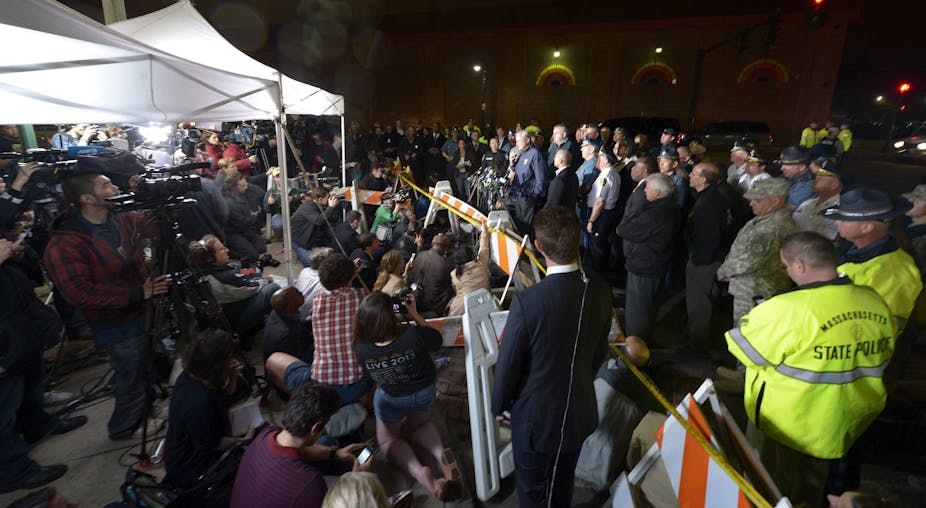Last week’s Boston Marathon bombings and the manhunt that followed showed all too starkly the challenges government agencies faced as they responded to the attack and sought to identify the perpetrators.
Not only were they dealing with unknown perpetrators on the run but also the mainstream media, an academic and pundit commentariat, and citizen cyber sleuths at large — who at times seemed as if they were in a race with responding agencies to identify the perpetrators and their motivations.
This second-guessing of authorities caused significant amounts of misinformation to be generated, and the mistaken identification of innocent people as suspects.
In an effort to break news first, several high-profile media networks appeared to rely heavily on source reporting. Although the media’s use of sources to pre-empt officialdom and be first to report information is not new, in counter terrorism response situations it can be dangerous, not least ethically questionable. Indeed it is fortunate some erroneous media announcements made in relation to the Boston incident and on the basis of source reporting did not have more serious implications for public safety and the integrity of the response operation.
Some media made scant if any mention that information their sources were providing had not come from official statements, and as such, the veracity of the sources’ information was unclear because it was not authorised for official release.
In response situations, agencies can be slow to release official statements because information must be verified and vetted, and public safety and operational security implications assessed prior to it being made public.
As a result, with limited official information available some in media turn to “experts” for comment and validation of source reporting. Sometimes this expert commentary is provided by academics.
Other times it is think tank pundits or private consultants with varying levels of experience and expertise. All featured in the widespread and often blanket media coverage of the Boston bombings.
But as the mistake-ridden coverage showed there are significant consequences arising from the practice of relying on unauthorised source information.
Indeed, academics should give pause to consider our role in this practice, particularly since in the absence of official information our role in media seems to increasingly be used as a means of legitimising source information.
In unfolding situations such as Boston – when official information can be in limited supply – those of us in the academic community should be cautious our commentary is not being sought or used to legitimate unconfirmed and unvetted information, which could not only be potentially wrong, but also harmful.
While it may appear more a media problem, it nonetheless remains an issue for academia because the race to be first with the news also appears to have led to a race to be first to explain or comment on news events. Within hours of the Boston bombings opinion pieces by members of the academic community had been written, despite officials having released very few confirmed details.
Although it is tempting to dismiss this as cases of individual academics seeking to be first past the post, universities too are becoming more corporate: seeking media exposure to help build their brand of expertise because this helps generate funding, numbers and better resource allocation. As a result, academic staff can feel pressured to build a media profile and go out and give comment.
One possible solution to this – which might afford academics protection from such pressure – is to develop something akin to a code of conduct. Having one in place might help them deal with pressure from media and from their academic institutions to provide comment. It would certainly help academics avoid being placed in situations where they are asked to provide expert comment on unverified and unauthorised information provided to media by sources of whom they have no knowledge.
Maintaining public confidence during a counter terrorism response is essential to public safety and the maintenance of law and order.
If the government reported all information it received in haste and by doing so reported erroneous information, such confidence would be undermined. Academics rushing to comment and offering up speculation (particularly if based on unverified and potentially unfounded reporting) can undermine public confidence in academia too.
Of course, it is not always that easy. Often academics do attempt to address and hose down speculation by providing background context that might discount source reporting or other questionable information, but then find their comments are presented as confirmation of reporting, or as additional speculation.
Here too having a code of conduct might assist in dealing with these circumstances and ensuring commentary we do choose to provide is appropriately and correctly contextualised.
We would all to do well to remember that our role is not just observational.
Academics providing commentary are a part of the media, and the way in which an incident is reported upon and understood can fundamentally shape its outcome.
This is all the more reason why we should consistently seek to ensure our commentary does not contribute to the spread of misinformation, and endeavour to find ways to improve our commentary practices.

